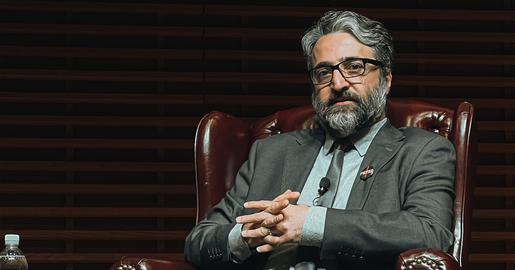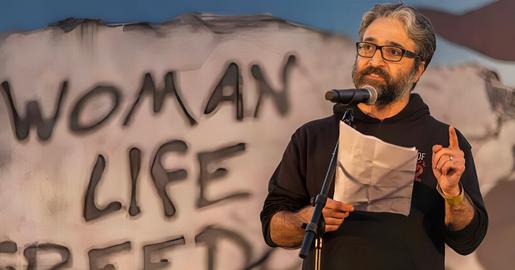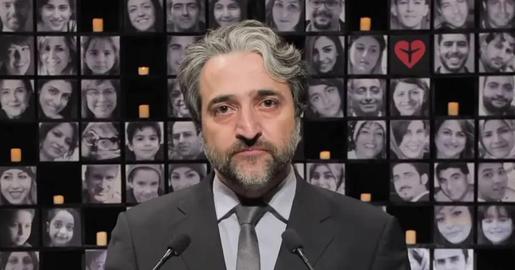Iranian-Canadian activist Hamed Esmaeilion emerged as a key opposition figure to the Islamic Republic following the eruption of nationwide protests sparked by the September 2022 death in police custody of Mahsa Amini.
In October last year, he co-organized a rally in Berlin that was joined by up to 100,000 Iranian exiles, in a formidable show of solidarity with their fellow-countrymen struggling against government brutality.
Esmaeilion lost his daughter and wife in the shooting down of a Ukrainian passenger plane by the Islamic Revolutionary Guard Corps (IRGC) over Tehran in January 2020.
He served as president and spokesperson for the Association of Families of Flight PS752 Victims, which is fighting for truth and justice for the victims of the tragedy, until he resigned in March of this year to dedicate himself to the “revolution” taking place in Iran.
In an interview with IranWire in Vienna, Esmaeilion spoke about his involvement in the pro-democracy movement over the past year.
***
How did things unfold for Hamed Esmaeilion in the past year, particularly since you and other exiled opposition figures released the “Mahsa Charter” in March setting out proposals for the establishment of a free and democratic Iran?
I believe we need to rewind to September 16, 2022, when Mahsa was killed by the Islamic Republic. At that time, we were deeply involved in the legal proceedings related to Flight PS752. Our days were filled with meetings, discussions and online campaigns. When the news of Mahsa's death broke, I was in Toronto, and we were in the midst of conversations about the documentary "752 is Not a Number."
From that moment, everything took a different turn. Initially, we had prepared for a gathering of 1,000 people to protest the plane incident in front of the Parliament of Canada. However, the situation changed unexpectedly, drawing thousands of participants.
I vividly recall that two days after Mahsa's death, I was invited to New York as a speaker. There was an ongoing march protesting President Ebrahim Raisi's presence at the United Nations headquarters. As I moved through the crowd, suddenly, they gave me a loudspeaker and said, "Chant." I remember echoing the slogans of the people in Tehran, Tabriz, Kurdistan and Baluchistan.
This became my life. Prior to this, I used to travel extensively, but most of my travels were within Canada. If circumstances had allowed it, I would have ventured everywhere.
After this march in Ottawa, a picture depicting you standing alone in the street, holding a picture of your family and a speaker, became viral. You used to scream in solitude, but a crowd of several thousand people joined you at this march. That day you became one of the few individuals representing the Iranian people abroad. Were you interested in sitting together with such people?
Firstly, let me clarify the context of the photo. This picture was taken near the International Aviation Organization, and I was not alone. There were hundreds of us, the majority being family members of the victims of the Ukrainian plane crash.
In early October 2022, I believe more than 150 cities, spanning from the easternmost parts of the world to the westernmost regions of America and Canada, took part in a nationwide march. Since then, I have maintained the belief, as expressed in my interviews, that if political parties, groups and civil institutions have any ideas, they should set aside their differences and present their proposals in a unified voice. Unfortunately, this has not materialized, and a key reason is the existence of parties abroad that, over the years, have failed to reach a consensus. I am aware that numerous discussions took place, but they never materialized.
For someone like me, who embarked on this path by accident, thoughts of overthrowing the Islamic Republic persist and continue to evolve. I think about the days after the fall of the Islamic Republic and the establishment of democracy as well as social, cultural, and environmental justice. The union of political parties remains my aspiration.
In other words, you didn’t believe in individuals or in a union of individuals…
There are individuals, both within and outside the country, but ultimately organizations should forge alliances. When examining the democratic process, one observes that in any individual-centric organization, historical patterns tend to repeat themselves. This historical recurrence is evident in revolutions in other countries as well. If our aim is to move beyond the Islamic Republic, and if it is believed that the majority of the people of Iran share a common objective, our focus should shift toward contemplating a referendum. A referendum holds the potential to transform the future of Iran.
Criticism emerged after the formation of this coalition, particularly concerning your behavior. Some people claimed that you displayed reserved behavior in initial meetings, particularly with Prince Reza Pahlavi. Another key point of contention was your stance on Mr. Pahlavi's slogan "the country's sovereignty." You have not responded to these criticisms.
During those days, there was a proliferation of rumors and misinformation, especially in the West. Responding to various topics, campaigns and rumors can divert your attention from your primary responsibilities. I recall that ahead of the Berlin march, there were discussions about the issue concerning the People's Mujahideen Organization. This seemed peculiar to me.
It's crucial to clarify that I have no religious beliefs. Therefore, how could I align or collaborate with an organization rooted in religious beliefs and ideologies? There would be no need for my involvement with such an organization even if I were to consider it.
In a press conference, you were asked whether you believe in the prosecution of those responsible for the mass execution of prisoners in the 1980s. You said that justice should be implemented for all, including MEK members who were executed. This brought the assumption that you might be close to this organization.
In the 1980s, executions were carried out by various factions, including left-wing groups and individuals closely associated with the government. There's an English proverb that says, "There is either justice for everyone, or no justice for anyone." I maintain my belief in seeking justice for those who were killed without trial at Refah School, for the casualties during the early years of the revolution, for those who were executed, and for those who lost their lives during protests throughout the years. It is not within my purview, or anyone else's, to mete out justice; it is the right of the people of Iran.
Now, returning to your question, there's an association being made between me and the IRGC, the MEK, the NIAC (National Iranian American Council) and various institutions. If I were to address each of these daily accusations, it would be a considerable undertaking. The truth is that public opinion exerted significant pressure for the formation of such an organization. I believe that political parties should come together.
In documents disclosed after the hacking of the Fars news agency, an IRGC commander is quoted as saying, "We have the potential to destroy Esmaeilion." You might have come across this statement as well.
I believe it was around November when this news circulated. However, it's important to note that the Islamic Republic possesses ample tools at its disposal. They have individuals both inside and outside the country, they control media outlets, a cyber army, and they have the capability to propagate a considerable amount of destructive misinformation. That is not exclusive to the Islamic Republic; similar things are observed in Russia, China and many other totalitarian governments.
Individuals who opposed and rebelled against the Islamic Republic sometimes unintentionally found themselves caught in the same wave of misinformation. While I refuted their claims once or twice, I reached a point where continuing this practice would require me to spend all my days answering them.
So, they achieved their goal…
I cannot definitively say whether they succeeded or not; however, their intention did not change my goal. After the demonstrations in Berlin, due to intense attacks and the magnitude of the demonstration, I was visited by some prominent figures. We had plans to continue these demonstrations in other cities. Executing such plans, as you know, is not an easy task. In Berlin, the focus was not on individuals; the central theme was Iran.
Presently, just as the issue of Palestine and Israel attracts global attention, when demonstrations take place in various European and American countries, the media automatically highlights the presence of people in the streets and their protests. This draws the attention of politicians worldwide. The same dynamic unfolded in Berlin: 100,000 Iranians were chanting slogans against the Islamic Republic. What else could have exerted pressure on the West to not reconcile with the Islamic Republic?
After Palestinian terrorist group Hamas attacked Israel on October 7, killing unarmed civilians, you were criticized for initially keeping silent and then for calling for a ceasefire when Israel launched its assault on Gaza.
There is no doubt that Hamas is a terrorist group, just as Hezbollah and the IRGC are.
It's essential to make independent judgments on matters related to human affairs. The Islamic Republic's support for any group is not contingent on their alignment with the Iranian people but rather driven by the regime's divisive stance. Looking at the situation from a human perspective, the actions of Hamas resulted in the death of numerous innocent civilians, including peaceful individuals like [Canadian peace advocate] Vivian Silver. Many children lost their lives in the attack.
Anticipating a "collateral publishment" [in Gaza], I emphasize that children are innocent bystanders in conflict. Regardless of the side they are on, standing on the children’s side is a moral imperative. My delay in condemning both parties was rooted in the understanding that if I had to denounce one side, I would subsequently condemn the other as well. My commitment is to stand with civilians and war victims, regardless of the side they may find themselves on.
Let's go back to Berlin. Before the march, I sent you a message that originated from one of my friends in Iran. This message emphasized the need for someone to organize people inside Iran, and you were presumably one of them. Do you think that you have since become less prominent?
I don’t think so. The conditions and atmosphere outside Iran are intricately linked to the circumstances within Iran. The violence displayed by the Islamic Republic has altered the landscape of the struggle in the country. Despite the threats of surveillance, identification, arrests and fines, people have initiated a new form of resistance. Through conversations with individuals in Iran and by staying abreast of the news, I understand that the nature of the struggle in Iran has evolved. Consequently, I recognize the necessity to adapt the form of my own struggle.
Engaging with international organizations, trying to shape civil institutions, talking to European politicians, meeting with young individuals, organizing demonstrations abroad, and maintaining a reduced presence on social media represent the new forms of fight.
Personally, I believe that we should speak about something only when we believe our efforts will reach a certain point or achieve the final goal. In Iran, there are organizations and unions constrained by limited freedom of action due to governmental pressure. Our task is to organize these entities abroad. In Vienna, I engaged in discussions with numerous influential individuals in recent days. Whether it is right or wrong, I've opted to spend less time on social media.
If we rewind to a year ago, or at least to January 1, would you still choose to participate in the Alliance for Democracy and Freedom in Iran?
If I could go back, I would engage in discussions with other members first and assess the mechanisms involved before making a decision. The drafting of the [Mahsa] charter was a crucial part of this process, outlining how individuals would come together, how the group would make decisions, and how each other's activities would be shared.
If a consensus could be reached, then I would certainly participate. If not, I would unequivocally choose not to be involved.
Is it possible for the same people to sit around a table again?
Not at all. At least under current conditions, I think it is unlikely.
And would you still choose to step down as spokesperson and president of the Association of Families of Flight PS752 Victims?
I’m still a board member but I no longer hold the position of spokesperson or president of the association. The decision to step down was the right one because I didn't want to bring a successful and well-established civic organization with me into unknown territory.
I wouldn’t have decided to step down from the roles of spokesperson and president if I hadn’t participated in the [Mahsa Charter].
It’s now time for the final question: Do you dream of your family?
Yes, yes. Very rarely, but it happens. I’m not a metaphysical person and I see dreams as a reflection of everyday events. When this happens and I see their image, I have a good day. I don't know how to say; I feel good during these days.
I went back to work as a dentist 40 days after that disaster and tried to hold on to my life. But those days I dream about are good days.
visit the accountability section
In this section of Iran Wire, you can contact the officials and launch your campaign for various problems



























comments